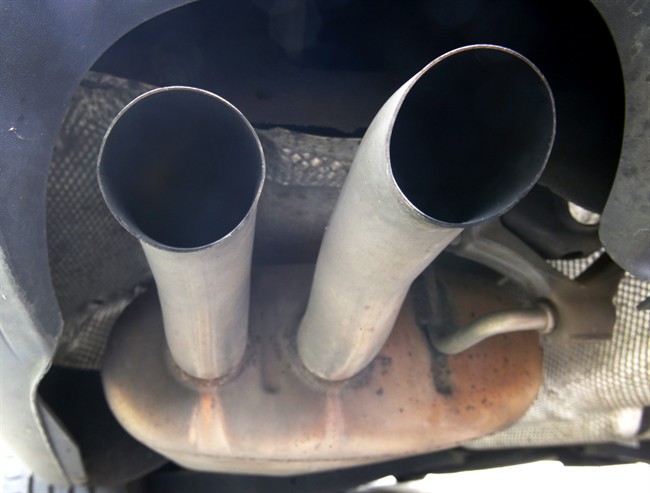FRANKFURT – For Volkswagen, the cost of its cheating on emissions tests in the U.S. is likely to run into the tens of billions of dollars and prematurely end its long-sought status as the world’s biggest carmaker.

As well as fines from governments, Volkswagen faces the massive expense of recalling up to 11 million cars globally.
Already the company has set aside 6.5 billion euros ($7.3 billion) to cover the fines and recalls — but it’s a fair bet that’s only the start. Some experts estimate the bill could ultimately be five times as large.
Beyond initial charges, the company is expected to suffer a drop in sales. And the damage to the brand’s image could take years to heal.
“This is damaging stuff that goes way beyond negligence and incompetence,” said Jeremy Robinson-Leon, principal and chief operating officer at New York-based PR firm Group Gordon. “The issue here is fraud and pretty brazen fraud at that.”
Here’s a look at the financial reckoning the Wolfsburg, Germany-based automaker will face. The blows could fall in multiple areas.
FINANCIAL CHARGES
The costs of fines, lawsuits and recalls are hard to estimate but have the potential to snowball.
Marc-Rene Tonn, an analyst at Warburg Research, says they could ultimately exceed 35 billion euros ($39 billion).
A chunk of that would come from fines from the U.S. Environmental Protection Agency, which could amount to as much as $18 billion. In theory, each of the 482,000 cars identified as having the deceptive software could be slapped with a $37,500 penalty. The actual fine will likely be much lower if the company co-operates with authorities. Tonn says it could reach 12.5 billion euros ($14 billion).
MORE: Complete coverage — VW emissions scandal

Get weekly money news
The carmaker faces dozens of lawsuits from U.S. states and counties. One county in Texas is seeking penalties worth $100 million, and that’s just one lawsuit.
Volkswagen may also face fines in other countries where it sold such rigged cars if there is evidence it cheated on emissions tests there, too. It is being investigated in Germany and other European countries.
Customers who feel cheated are going after Volkswagen as well, with several class-action lawsuits already filed in the U.S. and Europe. That could amount to billions more in damages.
And the cost of recalling and fixing the cars could run 2 billion euros ($2.2 billion) beyond what Volkswagen set aside, Tonn wrote in a research note to investors.
As a result, analysts are predicting a serious hit to Volkswagen’s profits.
Tonn halved his profit forecast for this year to 6.4 billion euros. For 2016, he reduced it to 11.0 billion euros from 15.7 billion euros.
Volkswagen has strong finances, starting with 20 billion euros in net industrial cash. It needs to keep at least 10 billion euros of that however to maintain its credit rating.
SALES
Volkswagen is expected to see a drop in interest in its cars because of the scandal, especially in the United States.
Already in September, Volkswagen’s sales in the U.S. barely grew despite the wider market’s double-digit growth, as it had to halt sales of many diesel vehicles.
Auto analyst Ferdinand Dudenhoeffer at the University of Duisburg-Essen estimates that Volkswagen could see vehicle sales fall by up to 10 per cent globally next year.
Earnings could take a bigger hit, as the company may have to hold down prices through purchasing incentives in order to maintain sales.
To make matters worse, the scandal comes just as demand is slowing in China, where Volkswagen’s brands are heavily exposed.
As for the company’s strategic goal of maintaining its lead over Toyota as the world’s biggest automaker, Dudenhoeffer says, “Forget about it.”
Toyota’s 10.23 million vehicles edged Volkswagen’s 10.14 million last year, though Volkswagen pulled ahead in the first six months of this year.
Dudenhoeffer said it would take Volkswagen at least five years to have another chance at passing Toyota.
SHARES
The scandal has caused Volkswagen’s shares to drop by about 40 per cent, lopping off about 30 billion euros ($33 billion) from the company’s market value.
That hit has been taken mostly by its big shareholders: the Piech and Porsche families, who control over 50 per cent of the company, and the other major shareholders: the state of Lower Saxony and Qatar Holdings.
BRAND VALUE
Perhaps the worst news for Volkswagen relates to the erosion of its brand — the intangible value of built up over decades.
The scandal has wiped $10 billion off the value of Volkswagen’s $31 billion brand, according to Brand Finance, a London-based firm that values corporate names by estimating what a company would have had to pay to license it if it didn’t already own it. The damage could be worse than that suffered by Toyota over unintended vehicle acceleration.
Volkswagen’s carefully tended brand means it has been able to charge more for the equivalent vehicle than competitors — a key driver of profit in the highly competitive market for basic transportation. Morgan Stanley estimated that weaker pricing could cost up to 4 billion euros in lost earnings next year.
Rebuilding trust will take time and money, including advertising.
Ioannis Ioannou, assistant professor of strategy and entrepreneurship at London Business School, said one thing Volkswagen could do is to invest in emissions testing in collaboration with the U.S. Environmental Protection Agency.
“Recovery will not be quick and will take time,” he said. “Volkswagen must be prepared to heavily invest in this recovery to bring back the trust and integrity it needs to survive.”





Comments
Want to discuss? Please read our Commenting Policy first.